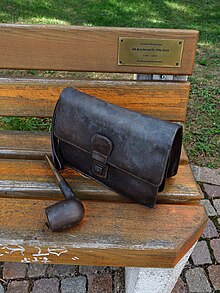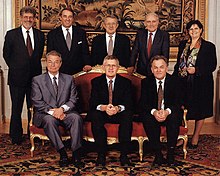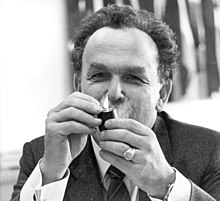Otto Stich
Anton Otto Stich-Stampfli (born January 10, 1927 in Basel ; † September 13, 2012 in Dornach SO ; legal resident in Dornach and Kleinlützel ) was a Swiss politician ( SP ). From 1984 to 1995 he was a member of the Federal Council and head of the Federal Department of Finance .
Life
Early years

Otto Stich was born in Basel as the son of the mechanic Otto Stich and his wife Rosa, née Gunzinger. He grew up in Dornach and attended primary and district school . His parents were both involved in social democracy, and his father was a member of the local council . Politics was an important topic of conversation in the family, especially because of the threat of fascism at the time and because of the Second World War .
Stich studied economics with Edgar Salin at the University of Basel . In 1953 he became a qualified commercial teacher, in 1955 he received his doctorate in political science. He then taught German, business, economics and political science at the trade school in Basel.
Local council and national council
In 1947, at the age of 20, Otto Stich became a member of the social democratic party of the canton of Solothurn. His political career began at the age of 26 with a seat on the Dornach Audit Commission. Four years later, in 1957, he was elected to the council and was also the office of the municipality Ammann take. His father Otto Stich-Gunzinger, who was vice-mayor from 1949 to 1957, had not run for office.
Stich ran for the first time for the National Council in 1959 . But since the previous ones started again, stitch had no chance. Four years later, however, Stich was able to replace Willi Ritschard , who renounced a national office in favor of a cantonal office, and was just elected to the National Council. It was 48 votes ahead in the first count, 24 in the second and 12 in the third and final count.
In the National Council, Stich mainly made a name for itself in economic and financial issues. From 1971 he was also President of the Economic and Financial Commission. In 1970 he took up the position of HR manager at Coop Switzerland and later became a member of the management.
In 1983, Stich was asked indirectly by his cantonal party not to run for the National Council. Above all, Ernst Leuenberger and Rolf Ritschard wanted to push Stich from his seat.
Federal Council
Willi Ritschard announced his resignation in parliament on October 3, 1983. At this point, Stich was sitting in parliament for the last week because he was no longer running in the upcoming renewal elections. The SP parliamentary group of the Federal Assembly proposed Lilian Uchtenhagen , a fellow student of Stich, as Ritschard's successor. Uchtenhagen was treated as a favorite during the preparations for the election. On December 7, 1983, Stich was unexpectedly elected to the Federal Council. In the first ballot, Stich was elected with 124 votes; Uchtenhagen had to be content with 96 votes. Stich was elected by the bourgeois majority - after what has since been known as the “ Night of the Long Knives ” - who, partly as a person and partly as a representative of the left, did not want to elect Ms. Uchtenhagen as first Federal Councilor. Stich shared the fate of his two predecessors, Hans-Peter Tschudi and Willi Ritschard, who were also elected to the Federal Council against the official candidate of the SP parliamentary group in 1959 and 1973 respectively.
Shortly after his election to the Federal Council, Otto Stich received an invitation to a work lunch with Ringier publicist Frank A. Meyer , to whom he had the message: “First of all, I don't eat when I'm working and, secondly, I don't work when I'm eating. And third, I really want to do both without Frank A. Meyer. "
The non-election of the official candidate sparked a discussion in the Social Democratic Party about withdrawing from the Federal Council, as requested by the party leadership, and led to a crucial test. A record-breaking extraordinary party congress in Bern in February 1984 decided to remain in the Federal Council with a large majority of 773 to 511 votes.
During his tenure, Stich was in charge of the finance department . In 1988 and 1994 he was Federal President . Stich was able to win over the section of the Social Democrats who had been disappointed in his election after a short time in office. He was particularly convincing with the tenacity and expertise with which he knew how to defend left-wing positions in the mostly bourgeois body. "Whether Astag or banks, our Otto will not waver," posted the social democratic base in his first year in office.
On August 31, 1995, Stich announced his resignation from the Federal Council on October 31. He mainly justified his resignation with his age. He later admitted that there was a connection with a defeat in the Federal Council in the decision to build the NEAT with the Lötschberg base tunnel .
In contrast to many former Federal Councilors, Stich repeatedly took part in political discussions even after his resignation; he said he had the right to do so just like any other citizen.
In December 2011 his autobiography was published under the title I just stayed simple.
After a short illness, Otto Stich died on September 13, 2012 at the age of 85.
In 2015 a square and a sculpture were dedicated to Otto Stich in Dornach. Objects typical of him are reproduced on a bench made of bronze : a tobacco pipe and a pipe bag.
Publications
- Anton Otto Stich: The Development of Business Administration into an Independent Discipline: A dogma-critical consideration of the development in the German-speaking area in the years 1900–1935, with special consideration of the relationship between business administration and economics (= Basler Betriebswirtschaftliche Studien. H. 15). Helbing & Lichtenhahn, Basel 1956 (dissertation, University of Basel).
- Otto Stich: I just stayed simple. An autobiography with accompanying texts by Ivo Bachmann . Petri, Basel 2011, ISBN 978-3-03784-015-3 .
literature
- Peter Graf, Jean-Noël Rey (Ed.): Otto Stich and the Art of the Possible: A Political Reader. Zytglogge, Gümligen 1987, ISBN 3-7296-0253-5 .
- Martin Beglinger: Otto Stich: The Red Confederate. Werd, Zurich 1996, ISBN 3-85932-183-8 .
- Christian Fehr (ed.): Heil Dir Helvetia - The joy of power. Edition Gutenberg, Hägendorf 1984, ISBN 3-905485-052 .
- Otto Stich in the Munzinger archive ( beginning of article freely accessible)
Web links
- Otto Stich: Official portrait of the federal administration
- Diego Hättenschwiler: Stich, Otto. In: Historical Lexicon of Switzerland .
- Obituary and speeches at the funeral service on September 21, 2012
- Publications by and about Otto Stich in the Helveticat catalog of the Swiss National Library
- Otto Stich in the archive database of the Swiss Federal Archives
- Otto Stich in various databases via Metagrid
Individual evidence
- ↑ Ancestors of Otto Stich. In: portrait archive. Retrieved November 5, 2019 .
- ↑ Dornach and his ammen. Retrieved January 6, 2018 .
- ↑ Otto Stich: I just stayed simple. Basel 2011, ISBN 978-3-03784-015-3 . P. 36
- ↑ René Zeller: Comrade Cactus. The choice of Otto Stich. In: Neue Zürcher Zeitung. November 30, 2015, p. 11 , accessed November 30, 2015 .
- ↑ SRG SSR Timeline
- ↑ Erik Ebneter: The stubborn Herr Stich. In: Basler Zeitung of December 13, 2011
- ↑ The death of former Federal Councilor Otto Stich. Federal Council press release, accessed on January 14, 2018 .
- ↑ Former Federal Councilor Otto Stich has died . In: Aargauer Zeitung of September 13, 2012
- ↑ René Lenzin: Stubborn, stubborn, stab. Obituary in: Tages-Anzeiger of September 13, 2012
- ↑ René Zeller : The comrade next door. Obituary in: Neue Zürcher Zeitung from September 13, 2012
- ↑ Otto-Stich-Platz is inaugurated. Oltner Tagblatt, June 29, 2015, accessed on July 4, 2015 .
- ↑ Martin Beglinger: Ke Gliichige. In: Tages-Anzeiger of September 13, 2012
| predecessor | Office | successor |
|---|---|---|
| Willi Ritschard |
Member of the Swiss Federal Council 1984–1995 |
Moritz Leuenberger |
| personal data | |
|---|---|
| SURNAME | Stitch, Otto |
| ALTERNATIVE NAMES | Stich-Stampfli, Anton Otto (full name) |
| BRIEF DESCRIPTION | Swiss politician (SP) |
| DATE OF BIRTH | January 10, 1927 |
| PLACE OF BIRTH | Basel |
| DATE OF DEATH | September 13, 2012 |
| Place of death | Dornach SO |




